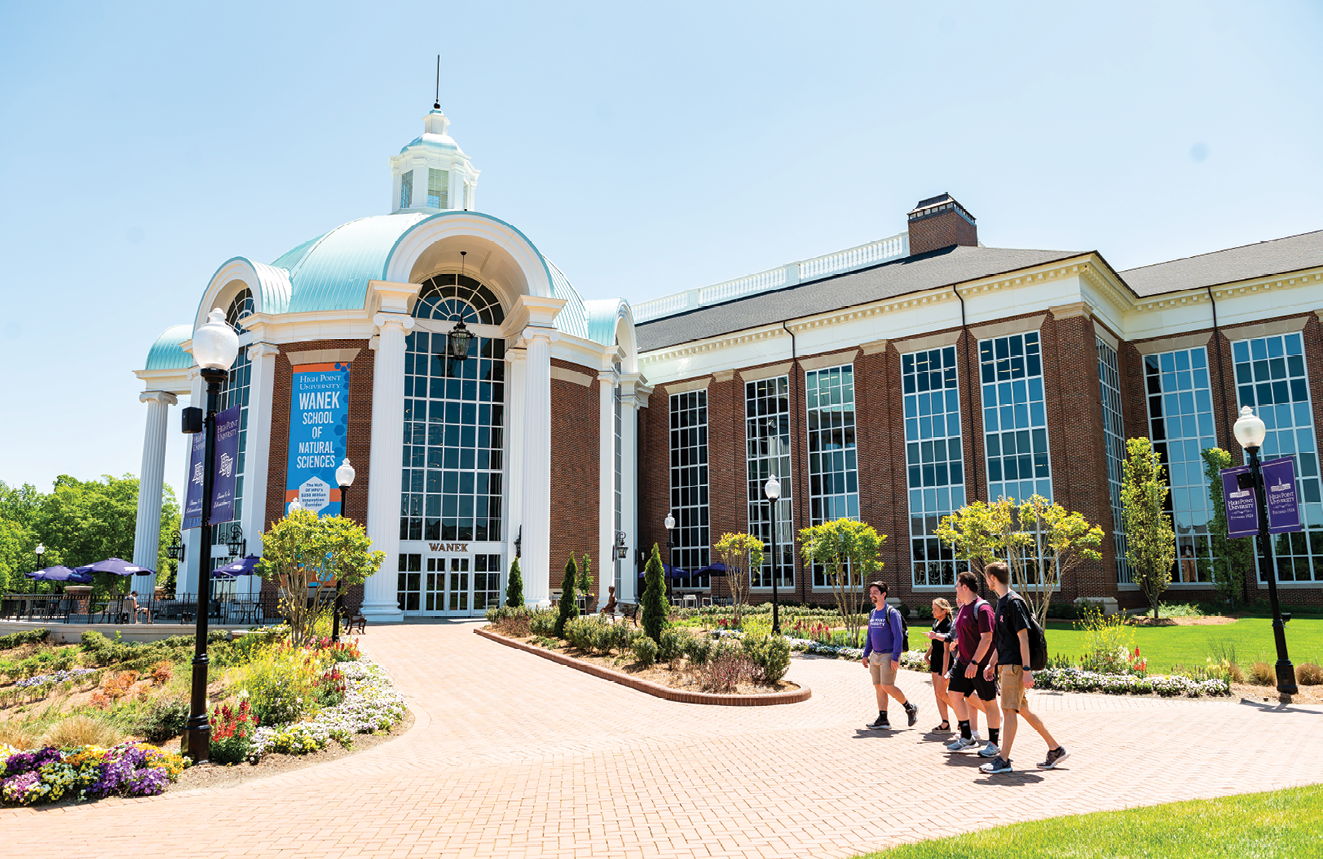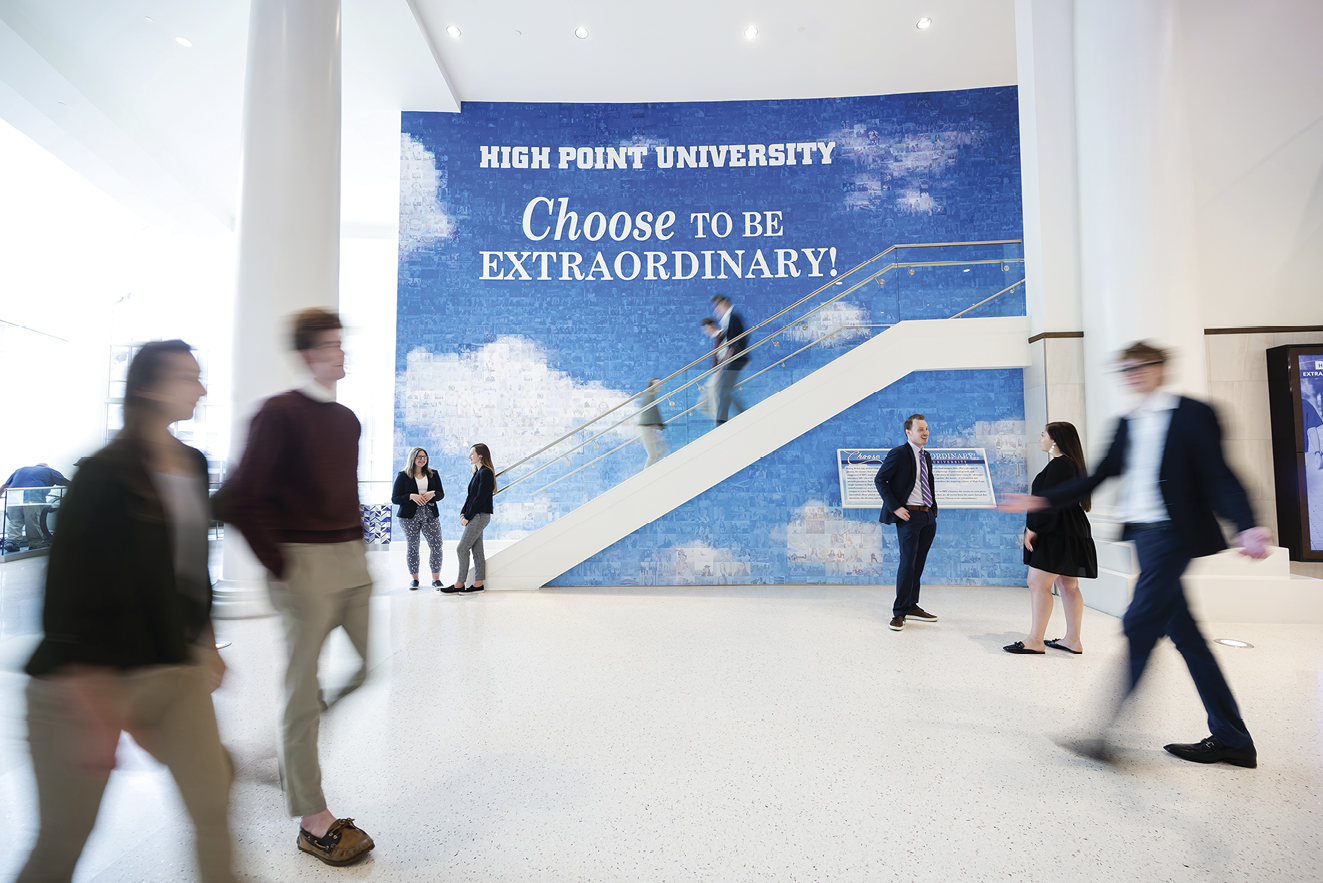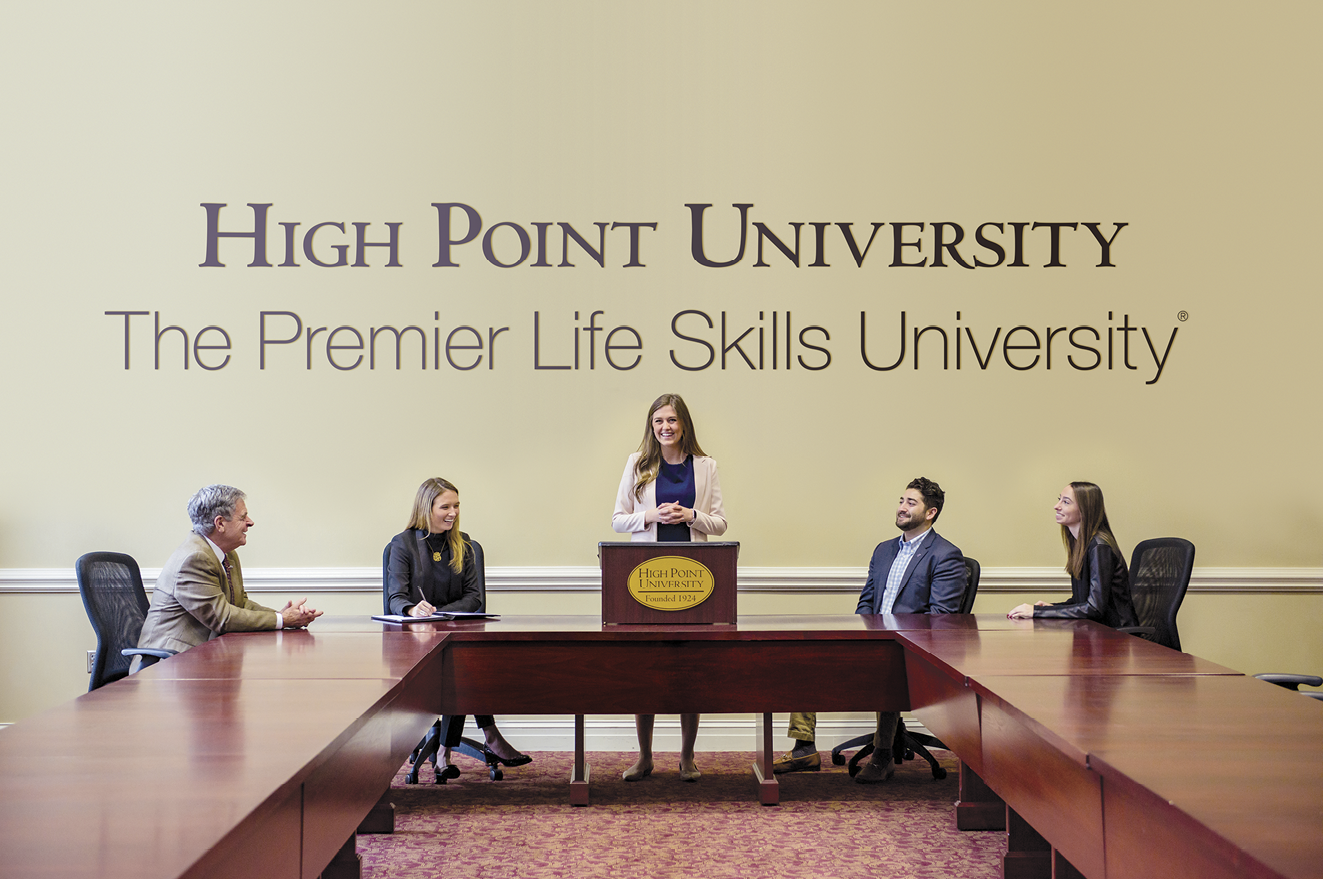- Home
- Media Kit
- MediaJet
- Current Issue
- Past Issues
- Ad Specs-Submission
- Ad Print Settings
- Reprints (PDF)
- Photo Specifications (PDF)
- Contact Us
![]()
ONLINE
![]()
ONLINE

The Premier Life Skills University
Editors’ Note
Dr. Nido Qubein became the seventh president of High Point University in January 2005. Since that time, enrollment has quadrupled, campus has expanded from 90 to 520 acres, and academic schools have grown from four to thirteen. He came to the United States as a teenager with limited knowledge of English and only $50 before going on to build business partnerships in banking, real estate, publishing, and retail businesses. Prior to his role as HPU president, Dr. Qubein rose to prominence as an internationally known author and consultant who has given more than 7,500 presentations worldwide. He serves on the corporate boards of several Fortune 500 companies including Truist, the sixth largest bank in the nation, La-Z-Boy and nThrive Healthcare. Dr. Qubein is also executive chairman of the Great Harvest Bread Company. Among numerous honors and recognitions that he has received, Dr. Qubein is an inductee of the Horatio Alger Association for Distinguished Americans, along with Oprah Winfrey and Colin Powell.
University Brief
Founded in 1924, High Point University (highpoint.edu) is a 98-year-old liberal arts institution located in the Piedmont Triad region of North Carolina. “America’s Best Colleges” 2022 Edition, published by U.S. News & World Report, ranks HPU number one among all regional colleges in the South (the eleventh consecutive year at number one). It also ranked HPU for the eighth consecutive year as the number one Most Innovative Regional College in the South for innovation in curriculum, faculty, students, campus life, technology, and facilities. HPU was named, for the twelfth consecutive year, to the national “Colleges of Distinction” list. HPU also earned Fields of Study distinctions for the Phillips School of Business and the Stout School of Education. The Princeton Review named High Point University as one of the nation’s top institutions for undergraduate education. The Princeton Review also named HPU in the 2023 edition of “The Best 388 Colleges” and on the Best Southeastern Colleges “2023 Best Colleges: Region by Region” list. HPU was also recognized among the Top 20 in the nation for Best-Run Colleges, Best Career Services, Most Beautiful Campus, Most Active Student Government Association, Best College Dorms and Best Campus Food, as well as a Great School for Business/Finance Majors and a Great School for Communication Majors.

The campus of High Point University
You came to the United States as a teenager with limited knowledge of English and only $50 in your pocket. Will you discuss this experience and how it impacted your life?
My life is a series of turning points. And for me, turning points were magical because out of adversity often emerges abundance. My father died when I was six years old, and that was tough for me. My mother played a pivotal role in my life. She had only a fourth-grade education, but she had a post-graduate degree in wisdom and uncommon sense. She insisted I go to school in the United States and pursue the American Dream.
I came to America to attend college and had the words of my mother still ringing in my ears: “If you want to be a great person, you have to walk side by side and hand in hand with great people.”
As soon as I finished graduate school, I started my first business following the principles that built America: personal initiative, the entrepreneurial spirit, and the ability to pursue new opportunities – these are all things we sometimes take for granted but, as an immigrant, I understand and value them tremendously.
That’s why at High Point University I tell families we are a God, family, and country school. Our country may not be perfect, but even with its blemishes, this nation is extraordinary. I thank God for its existence, for its strength, for the men and women who served in the military and for the American Dream. It is real for those who are willing to work hard enough and smart enough.
Will you highlight your business career and how your business experience prepared you to lead High Point University?
While I was in college, I worked as a youth counselor and sought out leadership materials that would help youth counselors grow professionally. I couldn’t find any, so I started a business to provide leadership materials for people like myself. I also began leading seminars and giving speeches, and my career began to grow in those areas.
I started other businesses and went on to write books, consult with corporate leaders and speak at conferences. Over the years, I’m blessed to have given more than 7,500 presentations worldwide. I served on corporate boards of several Fortune 500 companies including Truist, the 6th largest financial company in the nation, La-Z-Boy, and Savista. And I’m the executive chairman of the Great Harvest Bread Company with many stores from coast to coast.
I never expected nor sought to become president of High Point University, but when the Board of Trustees asked me to in 2004, I prayerfully considered it and accepted the challenge.
As a graduate of High Point University whose life was deeply and positively impacted by earning an education, and as a parent of four children, I began to understand the impact High Point University can have on the next generation of leaders. Today, I lead a transformed institution aimed at investing in our students’ lives for the better. Our goal is to prepare graduates not for the world as it is, but as it will be.
Did you always know that you had an entrepreneurial spirit and passion to build organizations?
I am the kind of person who wakes up every morning and happily says, “Good morning, Lord!” rather than the kind of person who wakes up and woefully says, “Oh Lord, it’s morning.” God has blessed me with energy, focus and passion. I remind our students every day that oxygen is a free gift not to be taken for granted. Without it, we would all die.
Do you feel that entrepreneurship can be taught or is it a skill that a person is born with?
At HPU, we believe in the art of the possible and seek to instill it in every student. We believe that having an entrepreneurial spirit is not just about building a widget and selling it. Rather, having an entrepreneurial mindset is about building appreciated value and rendering it for your client, customer, congregation, company – you get the idea. Everyone needs it to thrive. That’s why we passionately celebrate hard work, perseverance and personal initiative. It’s what built this country in the first place.
We do this in many ways. Consider the 50 bronze sculptures of historical trailblazers, such as Thomas Edison, George Washington Carver and Marie Skłodowska–Curie, that line the Kester International Promenade on our campus. When students see these sculptures and even sit down on a bench next to one, they realize that they, too, can achieve great things.
It’s why HPU houses a Center for Entrepreneurship filled with prototypes of students’ creations. Whiteboards line the walls, and students can use this collaborative workspace anytime. And every year, HPU hosts the Annual Elevator Pitch Competition and Business Plan Competition where students earn start-up funds for their businesses while also receiving feedback from a panel of judges consisting of business owners and entrepreneurs.
We also constantly bring real-life heroes to our campus for our students to connect with and learn from. Consider that Apple Co-Founder Steve Wozniak, the genius who invented the personal computer, is HPU’s Innovator in Residence and has worked alongside HPU students on a number of projects. Marc Randolph, the co-founder of Netflix, is also HPU’s Entrepreneur in Residence. In fact, more than 30 CEOs, tech titans and industry leaders regularly visit campus to mentor and teach students through our Access to Innovators program.
These are just a few examples. A student who wants to create impact, render value and create positive change in this world will thrive at HPU.
What interested you in assuming the role of president of HPU and made you feel it was the right fit?
I saw an opportunity to evolve a small, regional school into a dynamic, intentional university. I believed wholeheartedly that with a clear vision, a solid strategy and consistent execution, we could thrive.
I learned that my experience as an entrepreneur and consultant, which is similar as serving as an educator and coach, could in fact serve this university well. While I didn’t anticipate serving as president of my alma mater, I began my life working with young people, and I’m ending my life working with young people. One could say in many ways, I’ve invested my life preparing to work at High Point University.

Will you provide an overview of HPU’s transformation journey and how the university has evolved over the past 15 years?
When I arrived to HPU in 2005, I knew the university had to distinguish itself. We had to transform our campus and our culture in order to transform the lives of our students. As Richard Rohr, the Franciscan priest, said, “Transformed people transform people.”
I defined a clear vision and asked faculty and staff to join me in moving HPU from an ocean of sameness to a small pool of distinction. We became student focused. We didn’t make a single decision without asking how something served the best needs of the student.
Our campus culture is energized by the challenge to take HPU to new heights. During a short period of time that ordinarily would take decades to achieve, we became a highly ranked institution where enrollment has tripled from just 1,500 to 6,000. We expanded our campus from 90 to more than 520 acres. And academic schools grew from just four to eleven. To do that in such a compressed amount of time is unheard of in higher education.
We moved beyond focusing on the “product” – the diploma. Instead, we chose to focus on the product of the product – a life filled with meaningful success and framed with purposeful significance.
And it worked. Today, 98 percent of HPU graduates are employed or in graduate school within 180 days of graduation. That’s 14 points above the national average.
HPU has received an abundance of national recognition, too. U.S. News & World Report has ranked HPU the number one “Best Regional College in the South” for 11 consecutive years (HPU was number 17 in 2005) and the number one Most Innovative for eight consecutive years. The Princeton Review also recognizes HPU in “The Best 388 Colleges” publication, along with numerous Top 20 in the Nation awards, including: Best-Run Colleges, Best Career Services, Most Beautiful Campus, Most Active Student Government Association, Best College Dorms and Best Campus Food.
But most importantly, HPU became a place of deep, intentional mentorship that leads students through a personal, transformational process that enhances their lives. I remind faculty and staff that “we live, students watch and students learn.” Students need heroes, models and mentors to positively influence their lives and increase their impact.
Today, our incredible growth has been shared by so many parents, students and media outlets that some even refer to us as Transformation U.

How do you describe HPU’s culture and values?
First, HPU is The Premier Life Skills University.
Consider what the father of a student recently told me: “I wish I had been educated in an environment where people believed in me. You promote hard work, perseverance and the entrepreneurial spirit. You tell these young people to get up and try again. Do you know how long it took me to learn that?”
Students can’t walk a few feet on campus without seeing inspirational art, U.S. flags, energetic fountains and sculptures of history’s greatest leaders – including their words of wisdom etched into sidewalks. Why? Because we know that every moment of a student’s day is an opportunity to shape who they will become. We have succeeded because of this unique approach.
We are committed to equipping students with the capabilities that outlast and extend beyond inevitable technical changes. These include the ability to communicate well with others, thrive in a competitive environment, adapt, and navigate complex situations.
These are, in fact, the skills that employers say they need in new hires. HPU has conducted two national surveys – one in 2018 and another in 2022 – of 500 executives at companies of 2,500 employees or more. Consider some of these national poll results:
“When you hire recent college graduates, what are the reasons they fail?”
“Of these attributes, which would most likely cause an employee to be overlooked for a promotion at your organization?”
These results are merely snapshots of many others from HPU’s national C-suite surveys that show employers need people with life skills. Known as The Premier Life Skills University, HPU provides an extraordinary education framed with the life skills that outlast and extend over a lifetime.
Yes, our campus is filled with state-of-the-art technology, labs and learning spaces. In fact, U.S. News & World Report ranks HPU number one for Innovation in our category. Consider the financial trading room with a livestock ticker, the healthcare simulation labs, the professional-grade television studios, planetarium, and e-sports, among others.
Because HPU knows technology always changes, these facilities are steeped in life skills lessons, too. That’s why HPU is home to two fine dining restaurants with cell phone-free environments, where students practice job interviews over dinner and are exposed to global cuisine and protocol from different cultures.
When HPU students graduate, they are prepared to render value in the global marketplace with both technical and life skills. They are ready to adapt and change along with technology in order to thrive throughout their careers.
In addition, High Point University is a values-based institution, grounded in hard work, personal initiative, generosity, gratitude, faith, and civility. Parents spend their lives modeling values for their children. When they send their students to a university, they want it to uphold and nurture those values. When students choose a university, they want an institution that will serve as an extension of their home. We’ve built a culture that celebrates those values. It’s in the air at High Point University. And it’s the most consistent praise we hear from students and parents – that we’ve dared to build an environment and foster a culture where students choose to be extraordinary.
What do you see as the mission and purpose of a leading university today?
Our goal is to prepare the next generation of leaders for the world as it will be, not as it is. We are committed to giving students the premier life skills and the values-based education that prepare them to thrive and render value in a world that changes faster than you can download the latest app. We want them to decipher the difference between sound bites and sound judgment and to develop a depth of awareness and relevance. Their success is our success and our greatest reward.

You teach a course to all freshmen at HPU titled, “The President’s Seminar on Life Skills.” What was the vision for developing this class and what are the key messages you want to convey to the students?
I teach the First-Year Seminar on Life Skills so that I, personally, can mentor students on matters important in the marketplace. I love our students, and I care about their success. I invite global leaders, such as the co-founders or CEOs of Apple, Netflix, Domino’s, MyEyeDr. and the Dallas Mavericks, to guest teach the seminar as well.
This seminar gives students a hefty dose of real-world pragmatism as they enter HPU. The skills they learn are meant to help them succeed in all aspects of life – academic, professional, and personal. By taking the course as freshmen, the rest of their course work is often experienced through the lens of practical application. It sets the tone for developing an intentional life plan.
In short, we created an influential environment and resourced it with impactful people. The strategies we implemented and the success we achieved apply to anyone, whether you are a manager, a business owner, a CEO, a parent, or a friend.
What do you see as HPU’s responsibility to the community it serves and how important is it for HPU to be engaged in the High Point community?
Our city is a big part of our spirit and our heart. We will always be High Point’s University with an apostrophe “s,” and High Point will always be our home. For this reason, we volunteer 500,000 hours every year with at least 40 local agencies, and students participate in dozens of service-learning courses that engage them throughout the city to lend a helping hand. In addition to service, we have raised $63 million from private donors to build projects to bring visitors downtown year-round, including the new downtown ballpark known as Truist Point, an events center, a children’s museum, and a park.
In spring of 2022, the Nido and Mariana Qubein Children’s Museum opened, and just recently it was named North Carolina’s Attraction of the Year. This museum is a beautiful example of where our love for our city and HPU’s student volunteer efforts come together to grow a caring community and nourish healthy fellowship with one another.

Dr. Qubein talks with students at HPU
You serve on several company boards. What do you see as the role of a board member today?
Any person’s role, whether on a board or within an organization, is to render appreciated value in a rapidly changing world and to constantly keep the organization moving forward. Reinvention and adaptation are required at a fast rate in today’s global marketplace, where stagnation leads to failure. We must always be willing to spark growth, take calculated risks and measure whether or not your organization is truly meeting the needs of its constituents.
Effective corporate board members devote the time and effort necessary to learn all they can about their institutions and remain ever ready to serve the best interests of their stakeholders.
What do you feel are the keys to effective leadership?
The best leaders always strive to create greater capacity in others. They seek to inform, involve and inspire their teams to possess a growth mindset and focus on innovation and distinction. They insist on the thoughtful application of the organization’s vision, mission, value and goals. They inspect what they expect and learn from their productive failures.
Leadership is a privilege best appreciated by dedicated and committed people who seek a continuum of growth.![]()
How YOU can apply HPU’s transformational principles to your own life:
VALUES:
Values are everything, especially in a world where technology is advancing the speed and way in which decisions must be made. Remember these words of Roy E. Disney: “When your values are clear to you, making decisions becomes easier.” Know your values so you can live and lead by them.
THE ENTREPRENEURIAL SPIRIT:
Having an entrepreneurial mindset is not about building a widget and selling it. It’s about building value and rendering value for your client, customer, congregation, student – you get the idea. That’s why we seek to instill what I call “the art of the possible” in every HPU student. Leaders can foster, instill and celebrate the entrepreneurial spirit in every member of their team. From entry level to C-suite, working in an entrepreneurial manner benefits everyone.
LIFE SKILLS:
Employers seek new hires with more than technical competence because technology changes daily. The skills that outlast technological advances are what we call life skills – the ability to communicate, build relational capital, develop a growth mindset, embrace failure as a small price to pay for learning, solve complex problems and continuously adapt. At HPU, our curriculum is grounded in these skills. When you’re hiring or promoting team members, remember to ask: Is this person coachable? Are they motivated? Do they communicate well with others? If you give them a complex problem and ask them to figure it out, can they? Those are the people you want on your team.